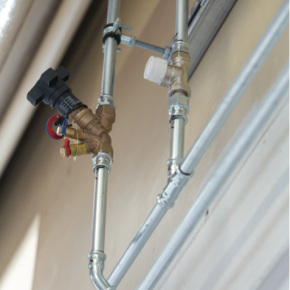
Cost-effective and sustainable pipework
Pipework can be described as the veins of our buildings, with issues such as corrosion causing damage locally and to the HVAC equipment and other machinery it services. Antony Corbett, product manager for Geberit, looks at the benefits of carbon steel in closed-circuit systems, a cost-effective solution that, if handled and installed correctly, can be kept free from corrosion. Find out more in the latest issue of ABC&D magazine…
Pipework may be humble in its make-up, but getting it right in terms of its function and the way it is installed is essential, with the knock-on effect of poor pipework potentially causing issues across a whole building. According to the HSE, in process industries, for example, corrosion is the largest single cause of plant and equipment breakdown.
So, how do building designers and installers juggle the needs of budget, timeframe and environmental impact, while ensuring quality is high and corrosion is nowhere to be seen? For closed-circuit systems, the answer is carbon steel, a modern material that has gained considerable market- share in recent years thanks to the fact it is lightweight, cost-effective and, if handled correctly, has a long life.
Correct handling and installation cannot be overstressed here. Any problems with carbon steel, which may have inspired caution towards its take-up, have come as a result of improper usage. Like anything in life, there is a right and wrong way to do things. Choose the right way – keep oxygen out when water becomes involved, follow manufacturer installation instructions and ensure correct commissioning and maintenance – and the benefits are clear.
When combined with pressing, the fast and easy alternative to solder and screws, which on its own saves money due to less time spent on site these benefits are further enhanced. With a proper understanding of how to use carbon steel in a pressing format, right- first-time installation is also guaranteed thanks to fail-safe leak testing.
Minimum exposure
Keeping exposure to oxygen at a minimum is the first step to limiting corrosion – true of any pipework or system that may be at risk. Because of this, carbon steel is not a solution for all piping requirements – it shouldn’t be used externally, for example.
Reducing contact with oxygen and water together must begin with the way carbon steel is stored. Carbon steel should be kept in a well-ventilated area that is clean and dry, away from pipes of different materials.
Pipes must be off the ground to prevent surface damage, with condensation avoided. Pipework should not be covered with foils in most cases, apart from plastic coated pipe, which is delivered with a foil hose to protect against dust.
Once installation is underway, following manufacturers’ instructions will ensure correct fitting – we offer free training for installers looking for some extra know-how.
As with storage, pipes should be kept clean and dust free, with only carbon steel used for associated fittings, such as inlet and return flow heating elements. Any signs of existing corrosion must be removed before adding new pipework. Once connected, sealing tape can help to provide complete protection.
Proper filling with potable water is key. Don’t worry about the oxygen that enters the circuit when it is being filled and topped-up with water, this does not pose a risk of corrosion as the quantities involved are very small.

“Any problems with carbon steel, which may have inspired caution towards its take-up, have come as a result of improper usage” Antony Corbett, Geberit
Commission, monitor and maintain
Pre-commissioning cleaning is essential with closed-circuit systems. As part of this process, BSRIA guidelines call for chemical dosing, which, if not carried out correctly and in-line with the requirements of the specific system, can in itself potentially cause corrosion.
During installation, commissioning and for ongoing peace of mind, we advise considering using an oxygen monitor. This will highlight any issues before corrosion takes hold, allowing building maintenance staff to investigate and correct problems, rather than rely too heavily on chemicals. Where any repair work is required, this must also be done in carbon steel and, when maintaining the system, don’t leave it empty.
Sustainable pipework solution
Not only is carbon steel cost-effective, it can be more sustainable too. Up to 50% lighter than traditional steel pipe, carbon steel produces less CO2 during manufacture. Furthermore, its carbon footprint is reduced in terms of transportation. With correct storage, installation, commissioning and maintenance, carbon steel offers benefits in terms of its price, durability and environmental impact. Add pressing into this mix and savings are enhanced, resulting in a long-lasting, fail-safe and quick to install solution for closed-circuit systems.
Geberit House
Edgehill Drive
Warwick
Warwickshire
CV34 6NH
Visit Supplier's page
Latest news

11th April 2025
Don’t Do a Dave! It’s Time to Lock FIT Show 2025 in Your Calendar!
It’s that time again – FIT Show is back! You could be forgiven for thinking there won’t be much new to see when FIT Show returns to the NEC from 29 April – 1 May. Wrong!
Posted in Articles, Building Industry Events, Building Industry News, Building Products & Structures, Building Services, Continuing Professional Development (CPD's), Exhibitions and Conferences, Information Technology, Innovations & New Products, Restoration & Refurbishment, Retrofit & Renovation, Seminars, Training
11th April 2025
Insight Data: Boost construction success with project and prospect data
For those working in construction – in whatever capacity – the last few years haven’t been much fun. And according to the latest statistics, it would seem the challenges are continuing – Alex Tremlett, Insight Data’s Commercial Director, has more…
Posted in Articles, Building Industry News, Building Services, Information Technology, news, Research & Materials Testing
11th April 2025
ASSA ABLOY EMEIA: Learn how to tackle the security challenges of digitalising access with insights from industry experts
In a new series of videos, experts in various specialisms within ASSA ABLOY share their expertise on digital access, including the complexities to overcome and the range of benefits for those who get digital access right…
Posted in Access Control & Door Entry Systems, Architectural Ironmongery, Articles, Building Industry News, Building Products & Structures, Building Services, Doors, Facility Management & Building Services, Information Technology, Innovations & New Products, Posts, Restoration & Refurbishment, Retrofit & Renovation, Security and Fire Protection, Videos
10th April 2025
Geberit completes 150 Acts of Kindness
Geberit has raised nearly £14,000 for various charities through its ‘150 Acts of Kindness’ initiative, a year-long programme of fundraising and volunteering to mark the company’s 150th anniversary in 2024.
Posted in Articles, Bathrooms & Toilets, Bathrooms, Bedrooms & Washrooms, Building Industry Events, Building Industry News, Building Products & Structures, Building Services, Charity work, Drainage, Interiors, Pipes, Pipes & Fittings, Plumbing, Restoration & Refurbishment, Retrofit & Renovation
 Sign up:
Sign up: